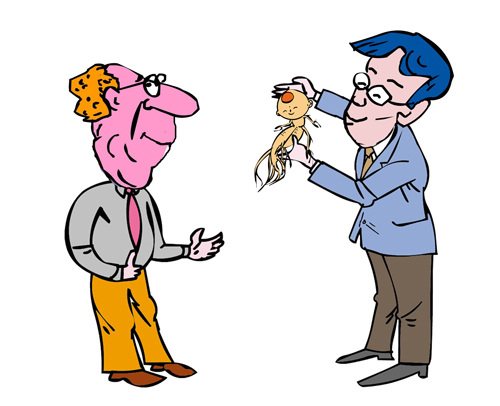|
|

|
|
(LI SHIGONG) |
We've all heard the tales surrounding past legends of people motivated by special quests. King Arthur sought the holy grail, Christopher Columbus sought a magic way to India for riches, and Ponce de Leon searched for the fountain of youth. Fables, myths, and tall tales? Not so if you happen to reach the Changbai Mountain in northeast China, or visit one of the special villages nearby like Fusong, where people are singing and selling songs about the real fountain of youth. These songs have been brought about by the magic of ginseng, a wonderful life-giving plant that has given rise to the legend of "ginseng babies."
Wait a minute, can we start from the beginning? Where and what are we talking about? Ok, I get it. You are reacting as any sensible person would if a stranger came up to you showing you a strange human-like looking plant, offering to sell it to you for bargain basement price right? Well, I did react this way about four years ago when visiting a small town in some remote part of China located at the base of the Changbai Mountain, an ancient volcano that houses the Heavenly Lake in its crater. Many pilgrims make the trek to this region perhaps for spiritual rejuvenation. I, however, was attracted after seeing several beautiful photographs of the lake and mountainous region taken by one of my colleagues at work. He had casually mentioned the existence of special medicinal herbs in the area, but this had not held my interest. I simply wanted to see if I could endure the mountain climb to reach the Heavenly Lake, since I had survived several volcanic mountains in Central America.
About two years later, having made the late summer trip by staggering up the 1,000 plus user-friendly mountain steps to view the magical blue waters, nestled in the bosom of a majestic skyline, I found a friendly local person enthusiastically presenting his rare plant collection for a special price.
"This plant is over 100 years old, and it has many natural healing properties. I can get about $800 for this specimen in the city. But, for you, I am willing to accept a lower sum."
We had just finished eating dinner and had stopped in front of a shop to look at souvenir bracelets. The young man slowly and cautiously uncovered what looked like a shriveled, embryonic-looking life-form that lacked a mouth and eyes.
"You must be careful," the young man went on, "because there are many people around here who claim to have the 'real' thing, that is naturally grown, but they are synthetic man-made products. This plant, however, is different, because it was found deep in the forests near a bear cave up in these mountains. It is clearly quite old and not a fake organically induced plant."
At that moment I felt as if this was a deja-vu experience. But no, I was not in Amsterdam, and this person was not trying to sell contraband. Needless to say, however, we did not buy his story, yet this encounter got me thinking and eventually I unearthed a research and scientific facts about the ginseng plant.
About three years later, returning to the magic mountain, the National Ginseng Museum has it home in the small city of Fusong. Not only are the streets lined with a wide variety of shops selling bear paws, tiger claws, deer antler chips, and local honeycomb, but these same shops are loaded with huge clear glass jars housing a variety of shapes and sizes of eerie-looking plant zombies.
They say if you eat this or drink that your liver problems will disappear, excess weight and unwanted body-fat will go away, your skin-tone will retain a youthful quality, and sexual energies will be unparalleled. This and more are claims made about the magical medicinal ginseng plant. I am not sure if anyone is smoking it yet, but I am sure someone may have even tried that outlet as well.
The modernistic architectural structure of the Ginseng Museum, which is corn-shaped from glass and steel, houses historic herb related articles, glass enshrined herbal plants that look every bit like human life forms, and a few huge, human-sized plants that evoke feelings of awe. While the museum store sells an assortment of stamped, sealed, and certified ginseng herbal plants and teas, the prices in local stores or the wholesale outlets in neighboring towns are fractional. Indeed, this part of China may not be well known for its secret sauces, but if you simply look around when visiting, one thing may become clear, the shoppers are actually singing about something special. Perhaps these are the "babies" that will never grow old.
The author is an American living in China |
